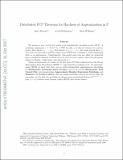Distributed PCP Theorems for Hardness of Approximation in P
Author(s)
Abboud, Amir; Rubinstein, Aviad; Williams, Ryan
DownloadSubmitted version (385.2Kb)
Open Access Policy
Open Access Policy
Creative Commons Attribution-Noncommercial-Share Alike
Terms of use
Metadata
Show full item recordAbstract
© 2017 IEEE. We present a new distributed} model of probabilistically checkable proofs (PCP). A satisfying assignment x ∈{0,1}^n to a CNF formula φ is shared between two parties, where Alice knows x-1, \dots, x-{n/2, Bob knows x-{n/2+1},\dots,x-n, and both parties know φ. The goal is to have Alice and Bob jointly write a PCP that x satisfies φ, while exchanging little or no information. Unfortunately, this model as-is does not allow for nontrivial query complexity. Instead, we focus on a non-deterministic} variant, where the players are helped by Merlin, a third party who knows all of x.Using our framework, we obtain, for the first time, PCP-like reductions from the Strong Exponential Time Hypothesis (SETH) to approximation problems in \P. In particular, under SETH we show that %(assuming SETH) there are no truly-subquadratic approximation algorithms for %the following problems: Maximum Inner Product over \{0,1\}-vectors, LCS Closest Pair over permutations, Approximate Partial Match, Approximate Regular Expression Matching, and Diameter in Product Metric. All our inapproximability factors are nearly-tight. In particular, for the first three problems we obtain nearly-polynomial factors of 2^{(log n)^{1-o(1)}};only (1+o(1))-factor lower bounds (under SETH) were known before.As an additional feature of our reduction, we obtain new SETH lower bounds for the exact} monochromatic Closest Pair problem in the Euclidean, Manhattan, and Hamming metrics.
Date issued
2017Department
Massachusetts Institute of Technology. Computer Science and Artificial Intelligence Laboratory; Massachusetts Institute of Technology. Department of Electrical Engineering and Computer ScienceJournal
Annual Symposium on Foundations of Computer Science - Proceedings
Publisher
Institute of Electrical and Electronics Engineers (IEEE)
Citation
Abboud, Amir, Rubinstein, Aviad and Williams, Ryan. 2017. "Distributed PCP Theorems for Hardness of Approximation in P." Annual Symposium on Foundations of Computer Science - Proceedings, 2017-October.
Version: Original manuscript